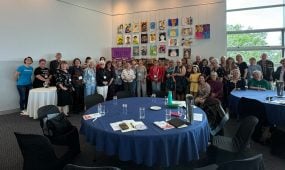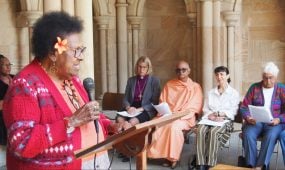Contemplative prayer: the value of taking time out
Reflections
“Pace (pronounced ‘par chay’) is Italian for ‘peace’. Our new Pace Community seeks to help bring peace to those who yearn for it – whether churched or unchurched for we are all seekers and searchers,” says The Rev’d Daniel Hobbs

Contemplative spirituality is an ancient practice approached from many traditions. Common to all, is the inner experience of a universal awareness beyond the material world. Such spiritual practices enables a sense of connectedness and oneness with the creative and life-sustaining power of the universe, the mystery Christians call ‘God’. This connection creates a sense of identity, relationship, meaning and purpose. It brings peace through the recognition that all is one and one is all. Everything belongs. For Anglicans, and Christians of many other denominations, the sacrament of Holy Communion embodies this reconciled wholeness between Creator and creation. It is in such moments of encounter we are called to a place of rest for our spirit and union with God, as we are embraced by Divine love.
Advertisement
Spirituality is experiential – it’s something we experience in practice. Spirituality moves beyond belief in specific religious doctrine, enabling the practitioner to experience the Creator and thus the nature of all creation and one’s place within it. It’s through this understanding some identify with the phrase “I am spiritual, but not religious.”
Depth in authentic spirituality requires a shift in consciousness – a shift from the dualistic mind to the contemplative heart. The discipline of psychology tells us that the human brain is hard-wired to perceive the world dualistically and that Western culture perpetuates this construct. However, in God’s Kingdom, seen through the eyes of spiritual wholeness, there is no ‘us versus them’. In contrast, the contemplative heart, seeking a measure of universal awareness, seeks to emulate the reconciled oneness of the universe – healing, uniting and holding as one all that is seen and unseen. This is a lifelong journey of encounter and practice. This vision was cast clear by the cross, one divine event drawing “all to himself” (John 12.32). To contemplate then is to go deep in search of the Divine, to gaze with the eyes of the heart, to seek out and mirror the Holy Spirit within.
Contemplative spirituality was once called ‘mysticism’. The word ‘mysticism’ attempted to convey the sense that humanity cannot fully know the divine, as the divine is universal ‘mystery’. Over time, the term ‘contemplative spirituality’ emerged incorporating a depth and breadth of practices transcending any one tradition. Both ‘mysticism’ and ‘contemplative spirituality’ portray an experiential rather than an intellectual spirituality.
Contemplative spirituality is a way of life, not a system of belief. To contemplate is to be aware of the Divine presence, “to live and move and have our being” in God (Acts 17.28). While it engages all the senses and faculties, it draws most from the inner centre of being Judeo-Christians call ‘the heart’. As St Bonaventure wrote so beautifully in The Soul’s Journey into God (1259):
Advertisement
“By praying in this way, we receive light to discern the steps of ascent into God. In relation to our position in creation, the universe itself is a ladder by which we can ascend into God. Some created things are vestiges, others images; some are material, others spiritual; some are temporal, others everlasting; some are outside us, others within us. In order to contemplate the First Principle [God], who is most spiritual, eternal and above us, we must pass through these vestiges, which are material, temporal and outside us. This means to be led in the path of God. We must also enter into our soul, which is God’s image, everlasting, spiritual and within us.”
Pace (pronounced ‘par chay’) is Italian for ‘peace’. Our new Pace Community seeks to help bring peace to those who yearn for it – whether churched or unchurched for we are all seekers and searchers. Our community is seeking to find a deep, abiding union with God and with each other by experiencing God in stillness, silence and solitude, whether on retreat, on pilgrimage or in prayer at home.
We hope to share our journey into God with you.





